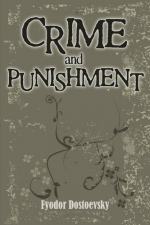|
|
Crime and Punishment Chapter 33
Porfiry gets straight to the point-he wants to be honest about his ways and methods. He explains the events that led him to suspect Raskolnikov. To trap Raskolnikov, Porfiry admits to using various tactics, like sending the mysterious man to call him murderer (he was counting on Raskolnikov's temperament to betray him). Porfiry believes Nikolay's confession is linked to extreme religious convictions. By confessing to the crime, Nikolay is, in a sense, taking his suffering.
Topic Tracking: Sacrifice/Suffering 7
No, the murderer is not Nikolay. Raskolnikov asks who then is the murderer. "Why, you, Rodion Romanovitch! You are the murderer," Porfiry whispers with conviction (p. 393). Raskolnikov asks why he is not arrested. Porfiry explains that he has no personal interest in ruining him, but that a righteous confession will be best for all involved. In addition, he says he has evidence that will allow him to arrest Raskolnikov sooner or later. Porfiry promises that upon confession, he will arrange for Raskolnikov to get a lighter sentence. Raskolnikov rejects the offer. Porfiry accuses Raskolnikov of being a Schiller, an idealist and tells him that he is still young, that serving justice will make him a useful citizen of society in due time. "What you need now is fresh air, fresh air, fresh air!" exclaims Porfiry (p. 397). Raskolnikov warns Porfiry not to take their conversation as a confession. Porfiry suggests to Raskolnikov that if he decides to end his life in some way, to leave a note as to the whereabouts of the stone. Raskolnikov waits for Porfiry to leave before he heads out.




